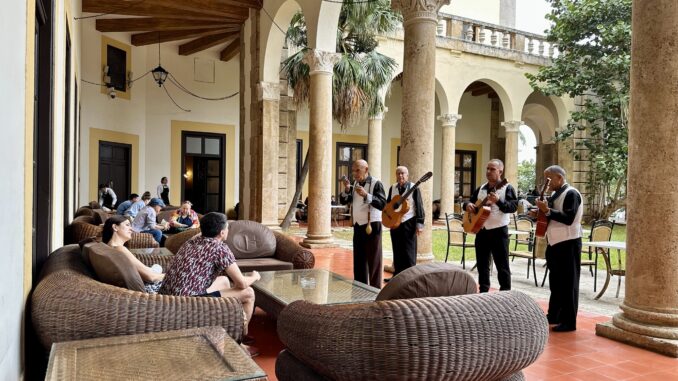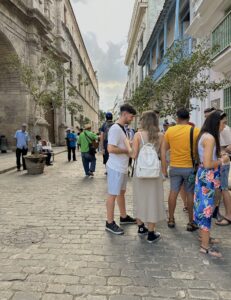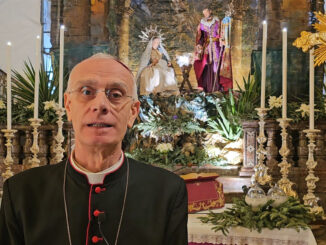
Il mio Natale a Cuba: la gioia e il dolore
Washington, 30 dicembre 2023 – Avevo il desiderio ardente di tornare a Cuba. Ci sono stato con altri giornalisti in un viaggio organizzato dal Centro Studi Strategici e Internazionali negli anni ’80; e ancora in un viaggio al National Press Club nel 2003.
A Natale sono tornato, proprio all’Avana, quella città vedova, e mi sono perso nel meglio di Cuba: la sua architettura, il suo cibo, la sua musica e la sua gente.
Ma intorno a me c’erano molti segnali dell’altra Cuba, la Cuba che è in extremis – la Cuba che sta spingendo i suoi cittadini ad andarsene in numero record.
Nel 2022, secondo alcuni resoconti, circa 400.000 cubani sono partiti per cercare lavoro e una nuova vita ovunque nel mondo potessero trovarla. L’agenzia Customs and Border Protection stima che negli ultimi due anni 425.000 persone abbiano cercato di entrare negli Stati Uniti.
Molti americani sono sorpresi di sapere che oggigiorno è possibile viaggiare facilmente a Cuba. La confusione nasce dal fatto che la legge sembra dire “no”, ma i regolamenti pubblicati dal Dipartimento del Tesoro dicono “sì”.
Mia moglie ed io abbiamo usufruito di un servizio viaggio commerciale a Cuba chiamato Cuba Explorer. Non volevamo andare come giornalisti; volevamo dare uno sguardo tranquillo all’Avana, non attraverso gli occhi della burocrazia. Ci siamo iscritti insieme a due amici, un medico in pensione e sua moglie.
La compagnia turistica ha organizzato il nostro visto cubano e il “Certificato di viaggio legale a Cuba”, un requisito degli Stati Uniti. Tutto quello che abbiamo fatto è stato acquistare i nostri biglietti con American Airlines, che opera un servizio giornaliero da Miami. Delta, Southwest e JetBlue e volano anche a L’Avana da varie città.
Le formalità alle frontiere non sono più difficili di quelle per qualsiasi paese, ad esempio il Messico o il Regno Unito.
L’Avana – e alcune delle città coloniali più piccole che ho visitato in precedenza – è una delizia. È tra le grandi “città costruite” del mondo, come Parigi, Vienna e San Pietroburgo. Tuttavia, poiché L’Avana è compatta, è facilmente visibile; è il tipo di posto in cui senti di poter abbracciare.

La grandezza del suo passato coloniale, la sua ricchezza d’altri tempi, è ovunque. Così è la povertà di oggi. Alcune strade sono davvero tristi, con tutte le manifestazioni dei paesi poveri: gente che raccoglie la spazzatura, carri a pedali, persino carri trainati da buoi. Ci sono poche persone in sovrappeso e, sebbene il cibo cubano sia complesso e sofisticato, mi hanno detto che i cubani sopravvivono nutrendosi di riso e fagioli.
Anche i cubani fanno la fila. Scherzando, un cubano mi ha detto: “Quando vediamo una linea, andiamo e ci fermiamo dentro – deve essere qualcosa di buono e, come tutte le cose buone qui, scarseggiano”.
Il cibo per chi è al di fuori dell’economia turistica guidata dal dollaro è una lotta, così come le medicine e le cose semplici, come lo shampoo preferito o prodotti di carta di ogni tipo. Per i viaggiatori, uno dei piaceri dell’Avana è che si riceve sempre un tovagliolo di stoffa, non per scelta ma per necessità. Il nostro nuovo e confortevole hotel ha finito la carta igienica. L’ossessione americana di portare con sé i Kleenex è tornata utile.
Le auto degli anni Cinquanta sono più numerose che mai, ma molte sono state riprogettate con moderni motori giapponesi o russi; alcuni dichiarano che sono tutti pezzi originali e usano cubani all’estero per pulire i depositi di spazzatura e rispedire i pezzi nei bagagli dei parenti.
Le sanzioni, con piccole modifiche, durano dal 1962 e sono le più lunghe mai viste nella storia degli Stati Uniti – e non hanno funzionato. Non hanno fatto crollare il Partito Comunista, né liberato la stampa, né migliorato la vita dei cubani. Invece, hanno sottratto la speranza.
L’embargo è una croce peculiare che solo Cuba porta, soprattutto se si pensa ai tanti regimi dittatoriali che tolleriamo e con cui siamo amici.
The Hill ha riferito che il presidente messicano Andres Manuel Lopez Obrador ha detto al presidente Biden in una telefonata che avrebbe potuto contribuire a ridurre la migrazione nella regione se avesse allentato le sanzioni contro Cuba. È difficile trovare un cubano che voglia lasciare l’isola, ma non lo farebbe se potesse.
Dopo 20 anni speravo di trovare una Cuba più prospera, ma non è successo. Le piccole aree di libera impresa consentite dallo Stato hanno creato piccole oligarchie. Tassisti e camerieri guadagnano molto più di medici e ingegneri. Questi professionisti contano tra le esportazioni di Cuba, la fuga dei cervelli. Il lato positivo è che ci sono molti ristoranti privati con una fiorente cultura gastronomica per coloro che se lo possono permettere.
La colpa è del fallito modello comunista cubano, ma gli Stati Uniti non hanno aiutato. Graham Greene, il grande scrittore britannico, che scrisse “The Power and the Glory” sulla rivoluzione messicana – dal 1910 al 1920 – sottolineò che essa fallì senza l’aiuto dell’embargo americano.
Ho la sensazione, ormai da 40 anni, che Cuba si libererebbe del comunismo se la lasciassimo stare e ci sbarazzassimo dell’embargo che riguarda più la politica statunitense che la politica di Cuba.
Nel frattempo, visita Cuba finché puoi. E’ una delizia per gli occhi, le orecchie e il palato. Non te ne pentirai.

……
My Christmas in Cuba — the Joy and the Sorrow
I have had a hankering to go back to Cuba. I went there with other journalists on a trip organized by the Center for Strategic and International Studies in the 1980s; and again on a National Press Club trip in 2003.
Over Christmas I went back, just to Havana, that dowager city, and lost myself in the best of Cuba: its architecture, its food, its music and its people.But around me were plenty of signs of the other Cuba, the Cuba which is in extremis — the Cuba which is driving its citizens to leave in record numbers.In 2022, by some accounts, about 400,000 Cubans left for work and a new life wherever in the world they could find it.
The Customs and Border Protection agency estimates that in a recent two-year period, 425,000 sought entry to the United States.Many Americans are surprised to hear that you can travel easily to Cuba these days. The confusion arises as the law seems to say “no,” but the regulations posted by the Treasury Department say “yes.”My wife and I went through a commercial Cuba travel service called Cuba Explorer.
We didn’t want to go as journalists; we wanted to take a quiet look at Havana, not through the eyes of officialdom. We signed up and so did two friends, a retired doctor and his wife.The tour company arranged our Cuban visa and the “Certificate of Legal Cuba Travel,” a U.S. requirement.
All we did was buy our tickets on American Airlines, which operates daily service from Miami. Delta, Southwest and JetBlue and also fly to Havana from various cities.Border formalities are no more difficult than they are going to any country — say, Mexico or the United Kingdom.Havana — and some of the smaller colonial towns which I visited previously — is a delight. It is among the great “built cities” of the world, like Paris, Vienna and St. Petersburg. However, as Havana is compact, it is easily seen; it is the kind of place you feel you can get your arms around.
The grandeur of its colonial past, its wealth of another time, is everywhere. So is the poverty of today. Some streets are sad, indeed, with all the manifestations of poor countries: people picking over garbage, pedal carts, even bullock carts. There are few overweight people and while Cuban food is complex and sophisticated, I’m told that Cubans survive on rice and beans.Cubans also queue. Jokingly, one Cuban told me, “When we see a line, we go and stand in it — must be something good and, like all good things here, in short supply.”Food for those outside the dollar-driven tourist economy is a struggle, as are medicines and simple things, like a favorite shampoo or paper products of all kinds.
For travelers, one of the pleasures of Havana is that you always get a cloth napkin, not of choice but of necessity. Our new, comfortable hotel ran out of toilet paper. The American obsession with carrying Kleenex came in handy.The 1950s cars are as plentiful as ever, but many are reengineered with modern Japanese or Russian engines; some declare they are all original parts and use Cubans abroad to scavenge junk yards and send parts back in relatives’ luggage.The sanctions, with small modifications, have lasted since 1962, and are the longest-ever in U.S. history — and they haven’t worked.
They haven’t brought down the Communist Party, freed the press or made the life of Cubans any better. Instead, they have subtracted hope.The embargo is a peculiar cross that Cuba alone bears, especially when you think of the many dictatorial regimes we tolerate and befriend.The Hill reported that Mexican President Andres Manuel Lopez Obrador told President Biden in a phone call that he could help reduce migration in the region if he could loosen the sanctions on Cuba. It is hard to find a Cuban who wants to leave the island, but wouldn’t if he or she could.After 20 years, I had hoped to find a more prosperous Cuba, but it hasn’t happened.
The small areas of free enterprise allowed by the state have created little oligarchies. Taxi drivers and waiters make much more money than doctors and engineers. These professionals count among Cuba’s exports, its brain drain. On the upside, there are many private restaurants with a thriving food culture for those who can afford it.
The fault is the failed Cuban communist model, but the United States hasn’t helped. Graham Greene, the great British writer, who penned “The Power and the Glory” about the Mexican Revolution — from 1910 to 1920 —pointed out that it failed without the aid of an American embargo.
I have felt, now for 40 years, that Cuba would throw off communism if we let it alone, and got rid of the embargo which is more about U.S. politics than the politics of Cuba.Meanwhile, do visit Cuba while you can. It is a treat for the eyes, the ears and the palate. You won’t regret it.
Photos Linda Gasparello
On Twitter: @llewellynking2Llewellyn King is executive producer and host of “White House Chronicle” on PBS.
Read this column on: White House Chronicle





